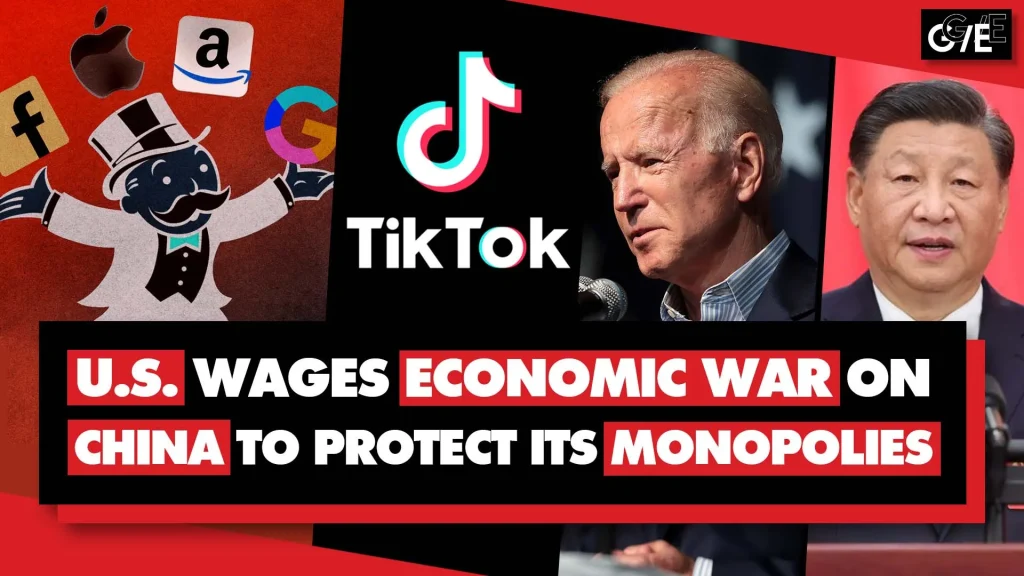
YouTube thumbnail with the monopoly character (Left), the TikTok logo (Center, Left) Joe Biden (Center, Right) and Xi Jinping (Right). Photo: Geopolitical Economy Report.

Orinoco Tribune – News and opinion pieces about Venezuela and beyond
From Venezuela and made by Venezuelan Chavistas

YouTube thumbnail with the monopoly character (Left), the TikTok logo (Center, Left) Joe Biden (Center, Right) and Xi Jinping (Right). Photo: Geopolitical Economy Report.
By Ben Norton – Mar 18, 2024
The US government’s plan to either ban TikTok or force owner ByteDance to sell it to a (US) company is part of Washington’s economic war on China, and an attempt to protect Big Tech monopolies from competition.
The US government has for years threatened to ban TikTok, one of the most popular social media apps in the country.
It’s now looking like this might actually happen.
This March, the House of Representatives voted overwhelmingly to pass legislation called the “Protecting Americans from Foreign Adversary Controlled Applications Act”.
This bill states that it “prohibits distributing, maintaining, or providing internet hosting services for a foreign adversary controlled application (e.g., TikTok)”.
It passed with an overwhelming majority of 352 votes in favor and just 65 votes against. It will now go to the Senate, where it is likely going to pass. And President Joe Biden has said he will sign the bill.
TikTok is not technically a Chinese company. It is based in Los Angeles, California, and also Singapore. The CEO of TikTok, Shou Zi Chew, is not Chinese; he is Singaporean.
Shou pointed this out many times when he was grilled in the US Senate by Republicans like Tom Cotton, who portrayed him as an agent of the Communist Party of China.
What the US government is trying to do with this legislation is force the owner of TikTok, the Chinese company ByteDance, to divest – and ideally sell TikTok to a US company.
If ByteDance refuses to sell its popular social media to its competitors, the US government will ban TikTok.
This is part of a technological war that Washington is waging against Beijing.
The US is essentially trying to block competition from Chinese tech companies, to protect Big Tech monopolies in Silicon Valley.
“Banning TikTok would boost Alphabet, Meta and Snap”, Forbes chirped excitedly in 2023. It noted that these “American technology giants could tack on some $431 billion in market value if the U.S. bans TikTok”.
For its part, Meta (which has tens of billions of dollars of contracts with multiple US government agencies) has spent years lobbying against TikTok.
The Washington Post reported in 2020, “Facebook parent company Meta is paying one of the biggest Republican consulting firms in the country to orchestrate a nationwide campaign seeking to turn the public against TikTok”.
To try to sabotage Chinese competition, the US is banning apps, imposing tariffs, and restricting exports – targeting Chinese electric vehicles, Chinese solar panels, advanced semiconductors, 5G tech, and smart phones, principally from cutting-edge companies like Huawei.
Washington’s goal is to prevent China from catching up technologically. And TikTok is only one part of this larger tech war.
US Commerce Secretary Gina Raimondo made this clear as day back in 2021, stating, “If we really want to slow down China’s rate of innovation, we need to work with Europe”.
The US commerce secretary has since repeated comments like this multiple times.
This March, Raimondo said that the US will “do whatever it takes” to prevent China from getting access to the most advanced technology.
It’s not a coincidence that, also in March, President Biden called for an investigation into the so-called “national security risks” posed by Chinese electric vehicles.
The Biden White House published an official statement claiming, “Chinese automakers are seeking to flood the autos market in the United States and globally, posing new threats to our national security”.
Biden made this statement just a few weeks after the billionaire oligarch Elon Musk, the CEO of Tesla, publicly called for trade barriers, to weaken Chinese competitors to his company (which has received billions of dollars of subsidies from the US government).
“If there are no trade barriers established, [Chinese electric vehicles] will pretty much demolish most other car companies in the world”, Musk complained in January. He added in despair that his Chinese competitors are “extremely good”.
The European Union is doing the same thing. In October, the European Commission announced an official investigation into Chinese electric vehicles.
This March, the EU revealed that it is likely going to put retroactive tariffs on Chinese EVs. (This came just a few weeks after Musk called for trade barriers.)
This is the root of the issue with TikTok. The West is waging a technological war on China.
Washington’s explicitly stated goal is to prevent China from catching up technologically and competing with US corporate monopolies.
This is an attempt to protect US Big Tech monopolies so they can continue to dominate the entire world, so there are no alternatives to US corporate hegemony.

Benjamin Norton is the founder and editor of the independent news website Multipolarista, where he does original reporting in both English and Spanish. Benjamin has reported from numerous countries, including Venezuela, Nicaragua, Bolivia, Ecuador, Honduras, Colombia, and more. His journalistic work has been published in dozens of media outlets, and he has done interviews on Sky News, Al Jazeera, Democracy Now, El Financiero Bloomberg, Al Mayadeen teleSUR, RT, TRT World, CGTN, Press TV, HispanTV, Sin Censura, and various TV channels in Mexico, Nicaragua, Venezuela, Ecuador, and Bolivia. Benjamin writes a regular column for Al Mayadeen (in English and Spanish). He was formerly a reporter with the investigative journalism website The Grayzone, and previously produced the political podcast and video show Moderate Rebels. His personal website is BenNorton.com, and he tweets at @BenjaminNorton.